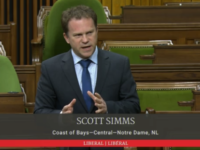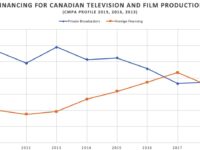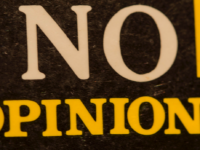Scott Simms, a Liberal MP from Newfoundland for 17 years, was long recognized as a leading voice on Parliament Hill on cultural and digital policy. Simms recently served as the chair of the Standing Committee on Canadian Heritage, which conducted the review of Bill C-10 and which placed him at the heart of one of the year’s more controversial pieces of proposed legislation. Simms was not re-elected this past fall and is now well positioned to reflect on policy making in Canada and the issues that arose with Bill C-10. He joins the Law Bytes podcast for a conversation about the bill, his suggestions for how the process can be improved, and his thoughts on the challenges of crafting forward-looking digital policies.
Post Tagged with: "broadcast"
Guilbeault’s Bogus Billion Dollar Claim: What the Data Actually Says About Canadian Film and TV Production
Canadian Heritage Minister Steven Guilbeault has said that his top legislative priority is to “get money from web giants.” While much of the attention has focused on his ill-advised plan to require Facebook to obtain licences for linking to news articles, his first legislative step is likely to target Internet streamers such as Netflix, Amazon and Disney with new requirements to fund Canadian content and to increase its “discoverability” by making it more prominent for subscribers. Based on his comments at several town halls, Guilbeault is likely to also create new incentives for supporting indigenous and persons of colour in the sector with a bonus for those investments (potentially treating $1 of investment as $1.50 for the purposes of meeting Cancon spending requirements). Much of the actual implementation will fall to the CRTC, which will be granted significant new regulatory powers and targeted with a policy direction.
An Anti-Digital Agenda: Forget the Digital Policy Reboot, the Government Just Hit Delete Instead
Last week, I wrote about the need for the Canadian government to reboot its digital agenda, arguing that less than 12 months after the 2019 national election, the policy agenda had gone off the rails with a reversal on affordable telecom services, delays in broadband support and privacy reform, as well as plans for extensive online regulation. The Speech from the Throne, which sets out the government’s agenda, suggests that rather than rebooting the digital agenda, the government has largely deleted it altogether.
The speech was the longest throne speech since the Liberal election in 2015, yet there was apparently no time to reference privacy reform, intellectual property, wireless, or innovation (innovative appears once). Instead, beyond catching up on unfulfilled promises on rural broadband and promising action on online hate, the government’s digital agenda is – as Canadian Heritage Minister Steven Guilbeault said last week – now distilled primarily down to “get money from web giants.” That isn’t a digital agenda, it’s anti-digital agenda, with technology companies cast as both a foreign enemy to be regulated and an ATM for free cash to fund pet projects in the cultural sector.
Why It’s Time to Reboot Canada’s Failed Digital Agenda
The government’s decision to prorogue Parliament and launch a new legislative agenda later this month offers more than just an opportunity to recalibrate economic priorities in light of the COVID-19 global pandemic. My Globe and Mail op-ed notes that less than 12 months after the 2019 national election, Canada’s digital policy agenda has gone off the rails and is badly in need of a reboot.
No Opinions Permitted: Broadcast Panel Rules Jokingly Criticizing Canadian Content During Radio News Segment Violates Code of Ethics
The Canadian Broadcast Standards Council has ruled that a news broadcast that jokingly criticized Canadian content violates the Canadian Association of Broadcasters’ (CAB) Code of Ethics and the Radio Television Digital News Association of Canada’s (RTDNA) Code of Journalistic Ethics. The complaint arose from a December 2019 broadcast on Toronto radio station CFRB. David McKee used his lead-in to a report on a possible Netflix tax to state “the libraries of streaming services like Netflix, Disney+ could soon have more of a Canadian flavour that nobody watches or wants if the federal government gets its way.”











